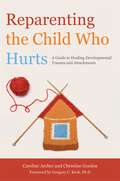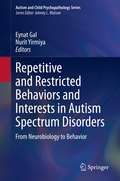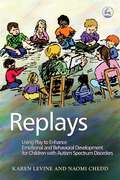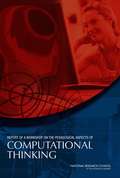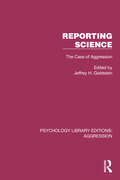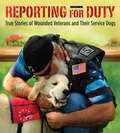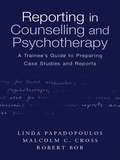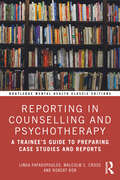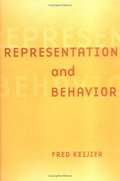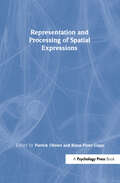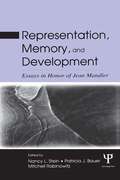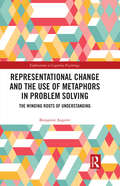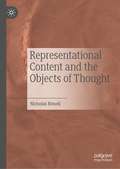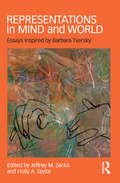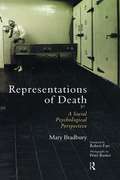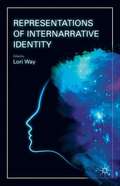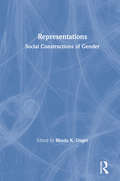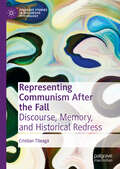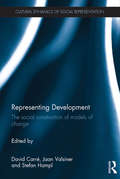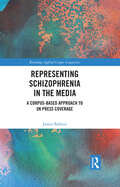- Table View
- List View
Reparenting the Child Who Hurts: A Guide to Healing Developmental Trauma and Attachments
by Caroline Archer Christine GordonFinally, a parenting book which demystifies the latest thinking on neurobiology, physiology and trauma and explains what the research means for the everyday life of parents of children who hurt. As experts on adoption and fostering who are adoptive parents themselves, Caroline Archer and Christine Gordon explain how this knowledge can help parents to better understand and care for their child. They explain why conventional parenting techniques are often not helpful for the child who has experienced early trauma and explore why therapeutic reparenting is the only way to help repair the unhealthy neurobiological and behavioural patterns which affect the child's development. They do not shy away from how difficult reparenting is, acknowledging how hard it can be to recognise our own fallibility as parents and to change our own parenting patterns. The authors also offer hard-won advice on a range of common parenting flashpoints - from defusing arguments and aggression to negotiating bedtimes and breaks in routine, and making sure that special occasions are remembered for all the right reasons. Reparenting the Child Who Hurts is a humane, no-nonsense survival guide for any parent caring for a child with developmental trauma or attachment difficulties, and will also provide information and insights for social workers, teachers, counsellors and other professionals involved in supporting adoptive and foster families.
Repentance
by Eloísa DíazA FINANCIAL TIMES 'SUMMER BOOKS OF 2021' PICK'An accomplished, inventive detective novel thrumming with tension and family secrets' Sanaë Lemoine, author of The Margot Affair'An astonishingly assured first novel, both funny and moving'The Times Crime Club'Very impressive... Repentance is an evocative crime thriller with a likeable, self-aware protagonist, but also skilfully explores the darkest period in Argentina's modern history'Financial Times'A powerful crime novel ... Opening old historical wounds that still strongly affect Argentinian society, this is a tale with many layers, many of them painful to evoke and a strong depiction of a country and a period that still simmers between the pages of history books and the crime novel is a perfect way of lancing the boil. Recommended'Maxim Jakubowski, Crime Time BUENOS AIRES, 1981.Argentina is in the grip of a brutal military dictatorship.Inspector Joaquín Alzada's work in the Buenos Aires police force exposes him to the many realities of life under a repressive regime: desperate people, terrified people and - worst of all - missing people.Personally, he prefers to stay out of politics, enjoying a simple life with his wife Paula. But when his revolutionary brother Jorge is disappeared, Alzada will stop at nothing to rescue him.TWENTY YEARS LATER...The country is in the midst of yet another devastating economic crisis and riots are building in the streets of Buenos Aires. This time Alzada is determined to keep his head down and wait patiently for his retirement. But when a dead body lands in a skip behind the morgue and a woman from one of the city's wealthiest families goes missing, Alzada is forced to confront his own involvement in one of the darkest periods in Argentinian history - a time ofcollective horror and personal tragedy.Alternating between two key moments in the life of a man and his country, Repentance is a noir with a difference, featuring an unforgettable character on a quest to solve a case that offers both a painful reminder of all he has lost and a last chance at redemption.
Repetition and Trauma: Toward A Teleonomic Theory of Psychoanalysis
by Max M. Stern Liselotte Bendix SternThe culmination of over three decades of investigation into traumatic processes, Repetition and Trauma is the late Max Stern's pioneering reconceptualization of trauma in the light of recent insights into the physiology and psychology of stress and the "teleonomic" character of human evolution in developing defenses against shock. As such, it is a highly original attempt to reformulate certain basic tenets of psychoanalysis with the findings of modern biology in general and neurobiology in particular. At the core of Stern's effort is the integration of laboratory research into sleep and dreaming so as to clarify the meaning of pavor nocturnus. In concluding that these night terrors represent "a defense against stress caused by threatening nightmares," he exploits, though he interpretively departs from, the laboratory research on dreams conducted by Charles Fisher and others in the 1960s. From his understanding of pavor nocturnus as a compulsion to repeat in the service of overcoming a developmental failure to attribute meaning to states of tension, Stern enlarges his inquiry to the phenomena of repetitive dreams in general. In a brilliant reconstruction of Freud's Beyond the Pleasure Principle, he suggests that Freud was correct in attributing the repetitive phenomena of traumatic dreams to forces operating beyond the pleasure principle, but holds that these phenomena can be best illumined in terms of Freud's conception of mastery and Stern's own notion of "reparative mastery."
Repetitive Transcranial Magnetic Stimulation Treatment for Depressive Disorders
by Paul B Fitzgerald Z. Jeff DaskalakisRepetitive transcranial magnetic stimulation (rTMS) treatment is increasingly being used in the management of patients with depression. Nevertheless, considerable ignorance still exists about the treatment in general psychiatric practice. This concise clinical guide will serve as a reference and practical tool for clinicians working with or learning about this treatment technique. The opening chapters provide basic information on the history and development of rTMS treatment and its mechanism of action. Use of the treatment in depression is then addressed in detail, with explanation of the evidence base and discussion of a variety of clinical issues. Side-effects of treatment are explored, and careful consideration is given to the establishment of rTMS treatment programs and the training of clinicians. The final chapters will provide a brief overview of potential rTMS applications in other psychiatric conditions and some background on related treatments.
Repetitive and Restricted Behaviors and Interests in Autism Spectrum Disorders: From Neurobiology to Behavior (Autism and Child Psychopathology Series)
by Nurit Yirmiya Eynat GalThis volume examines repetitive and restrictive behaviors and interests (RRBIs) affecting individuals with autism spectrum disorder (ASD). The various aspects of RRBIs, an umbrella term for a broad class of behaviors linked by repetition, rigidity, invariance, and inappropriateness to place and context are reviewed by an international team of expert leaders in the field. Key topics of coverage include:Neurological Mechanisms Underlying Repetitive: Animal and human modelsUnderlying mechanisms of RRBs across typical and atypical developmentThe relationship between RRBI and other characteristics of ASD (communication, social, sensory aspects) RRBIs and adults with ASDDiagnosing RRBIs An RRBI intervention modelThe book bridges the gap between the neurobiological and neurocognitive bodies of knowledge in relation to RRBIs and their behavioral aspects and examines associations with other domains of ASD. In addition, the volume addresses related assessment and treatment of RRBI in ASD. This is an essential resource for researchers, graduate students, clinicians and related therapists and professionals in developmental psychology, behavioral therapy/rehabilitation, social work, clinical child and school psychology, child and adolescent psychiatry, pediatrics, occupational therapy and special education.
Replays: Using Play to Enhance Emotional and Behavioural Development for Children with Autism Spectrum Disorders
by Karen Levine Naomi CheddReplays addresses the challenging behaviors of children with autism spectrum disorders through interactive symbolic play. It shows parents and professionals how to help children access their emotions, whether the child is verbal or not, cognitively able or impaired, even-tempered or volatile. The chapters introduce and show readers how to implement Replays, and describe ways of adapting this intervention to address specific issues in different settings and circumstances. Levine and Chedd present more than just behavioral management strategies in the context of social, emotional and communication development: they have developed a technique that helps children to re-experience, play through and master the complex emotional response states that often lead to ongoing behavioral challenges. Replays is an easy and fun tool that provides numerous step-by-step examples and illustrations. It enables parents and professionals to guide children with autism spectrum disorders towards mastering, and changing, their emotional and behavioral responses.
Report of a Workshop of Pedagogical Aspects of Computational Thinking
by The National Academy of SciencesIn 2008, the Computer and Information Science and Engineering Directorate of the National Science Foundation asked the National Research Council (NRC) to conduct two workshops to explore the nature of computational thinking and its cognitive and educational implications. The first workshop focused on the scope and nature of computational thinking and on articulating what "computational thinking for everyone" might mean. A report of that workshop was released in January 2010. Drawing in part on the proceedings of that workshop, Report of a Workshop of Pedagogical Aspects of Computational Thinking, summarizes the second workshop, which was held February 4-5, 2010, in Washington, D. C. , and focuses on pedagogical considerations for computational thinking. This workshop was structured to gather pedagogical inputs and insights from educators who have addressed computational thinking in their work with K-12 teachers and students. It illuminates different approaches to computational thinking and explores lessons learned and best practices. Individuals with a broad range of perspectives contributed to this report. Since the workshop was not intended to result in a consensus regarding the scope and nature of computational thinking, Report of a Workshop of Pedagogical Aspects of Computational Thinking does not contain findings or recommendations.
Reporting Mental Illness in China (Routledge/Asian Studies Association of Australia (ASAA) East Asian Series)
by Guy RamsayThis book examines how Chinese-language newspapers across greater China report on severe mental illness, and why they do so in the ways they do, given that reporting in local newspapers can strongly influence how Chinese readers view the illness. By assessing how the reporting in three leading broadsheet newspapers from mainland China, Hong Kong, and Taiwan constructs the illness, the book considers how the distinct social and political histories of the three culturally Chinese communities shape the reporting, and whether it bears out or contests the intense stigma against the illness that prevails locally. The findings can usefully encourage and inform attempts to humanise, include, and empower those with a severe mental illness across greater China and the global Chinese diaspora. Employing a well-tested, transparent discourse analytic approach, the book also includes numerous Chinese-English bilingual news report extracts to illustrate its claims. As such, Reporting Mental Illness in China will be of interest to sinologists, discourse analysts, mental health professionals and public health authorities across the globe, especially in places where there are large Chinese-speaking populations.
Reporting Science: The Case of Aggression (Psychology Library Editions: Aggression)
by Jeffrey H. GoldsteinOriginally published in 1986, this is a nonscientific book about science. It is concerned with the relationships among social science, journalism, public information, and public policy. Reporting Science: The Case of Aggression explores some of the obstacles – and suggestions for overcoming them – to the mutual exchange of information when that information concerns research and theory on a sensitive issue, in this instance, violence.Among the issues explored are: What is the social scientist’s responsibility, if any, for the public dissemination of his or her work? How accurate are mass media reports of scientific research on such socially sensitive issues as violence and the effects of mass media portrayals of sex and aggression? How do science journalists select particular pieces of research for study? How can interested scientists more effectively present their work to the public? What are the ethical issues involved in greater scientist-journalist cooperation?
Reporting for Duty: True Stories of Wounded Veterans and Their Service Dogs
by Tracy J. LibbyInspirational accounts of veterans who have moved forward from mental and physical injuries toward healthier lives with the help of service dogs. Hundreds of thousands of military veterans seek treatment for post-traumatic stress disorder (PTSD) each year. Service dogs have been used for many years in the civilian sector to help their disabled owners perform necessary tasks in daily life; likewise, the organized use of therapy dogs to bring comfort and companionship to hospital and nursing-home patients dates back more than four decades. Reporting for Duty explores the unique and special bond between wounded warriors—especially those suffering from PTSD—and their service dogs and discusses the vital work of therapy dogs who visit VA hospitals and military rehabilitation facilities. Author Tracy Libby tells the true stories of disabled veterans who have been touched, assisted, and enriched by the dogs in their lives, and the new lease on life is reciprocal: many of these service and therapy dogs have been rescued from shelters and specially trained for their jobs. A portion of proceeds from the sale of this book will benefit a veterans&’ service-dog organization.Inside Reporting for Duty . . .True stories of physically and mentally disabled veterans who count on service dogs for assistance with daily tasksAn explanation of PTSD and how it affects military veteransHow therapy dogs and service dogs are selected and trained for their jobsRescuing shelter dogs to train for therapy and service workHow the military is training dogs to accompany soldiers on deploymentsA look at the bond between people and dogs and the positive effects it has on both
Reporting in Counselling and Psychotherapy: A Trainee's Guide to Preparing Case Studies and Reports
by Linda Papadopoulos Robert Bor Malcolm CrossTrainee therapists need to show practical competence through the production of client reports and case studies. Reporting in Counselling and Psychotherapy is a unique hands-on guide to this element of practical work. Using clinical examples to guide the reader, and a detailed analysis of case study and process report writing, it will show how to present clear, concise and properly presented reports. The book will be an invaluable tool, not only for those embarking on practical training in psychotherapy, counselling and psychology, but also for trainers in these areas and for clinicians writing clinical reports or case presentations.
Reporting in Counselling and Psychotherapy: A Trainee's Guide to Preparing Case Studies and Reports (Routledge Mental Health Classic Editions)
by Linda Papadopoulos Robert Bor Malcolm C. CrossShowing practical competence through the production of client reports and case studies is a key aspect of training therapists and other mental health professionals. This Classic Edition of Reporting in Counselling and Psychotherapy offers a unique hands-on guide to this element of practical work. Using clinical examples to guide the reader, and a detailed analysis of case study and process report writing, it shows readers how to present clear, concise and properly presented reports.This book remains an invaluable tool, not only for those embarking on practical training in psychotherapy, counselling and psychology, but also for trainers in these areas and for clinicians writing clinical reports or case presentations.
Representation and Behavior
by Fred A. KeijzerFred Keijzer stresses that representations are the starting point for a set of processes that lead back to the external environment. They are used as theoretical components within an explanation of a person's outwardly visible behavior.
Representation and Processing of Spatial Expressions
by Patrick Olivier Klaus-Peter GappCoping with spatial expressions in a plausible manner is a crucial problem in a number of research fields, specifically cognitive science, artificial intelligence, psychology, and linguistics. This volume contains a set of theoretical analyses as well as accounts of applications which deal with the problems of representing and processing spatial expressions. These include dialogue understanding using mental images; interfaces to CAD and multi-media systems, such as natural language querying of photographic databases; speech-driven design and assembly; machine translation systems; spatial queries for Geographic Information Systems; and systems which generate spatial descriptions on the basis of maps, cognitive maps, or other spatial representations, such as intelligent vehicle navigation systems. Though there have been many different approaches to the representation and processing of spatial expressions, most existing computational characterizations have so far been restricted to particularly narrow problem domains, usually specific spatial contexts determined by overall system goals. To date, artificial intelligence research in this field has rarely taken advantage of language and spatial cognition studies carried out by the cognitive science community. One of the fundamental aims of this book is to bring together research from both disciplines in the belief that artificial intelligence has much to gain from an appreciation of cognitive theories.
Representation, Memory, and Development: Essays in Honor of Jean Mandler
by Patricia J. Bauer Nancy L. Stein Mitchell RabinowitzA festschrift to honor Jean Mandler, this volume contains contributions from leading scholars focusing on the child's development of memory, visual representation, and language. It is appropriate for students and researchers in cognitive psychology, language acquisition, and memory.
Representational Change and the Use of Metaphors in Problem Solving: The Winding Roots of Understanding (Explorations in Cognitive Psychology)
by Benjamin AngererThis book addresses a longstanding impasse in problem solving research: if structured mental representations of problems are required for solving them, how do those arise and, if needed, change? The book argues that established theories underestimate this question due to methodological requirements. Proposing to momentarily suspend these requirements, including the focus on well-defined puzzle tasks, the book suggests to alternatively conduct exploratory studies with more complex, open-ended problems. It presents a qualitative case study of participants working for several days on a mental paper folding task designed to challenge them to construct their own representations. Charting their use of gestures, metaphors, and ever more complex descriptions, it carefully traces the chronology of their thinking. Combining in-depth empirical investigation with theory-building, the book proposes a framework of problem solving that goes beyond established models, accommodating associative, motivational, and affective factors. This book will be of great interest to researchers, academics, and postgraduate students in the fields of cognitive science, psychology, philosophy of mind and cognition, and cognitive artificial intelligence.
Representational Content and the Objects of Thought
by Nicholas RimellThis book defends a novel view of mental representation—of how, as thinkers, we represent the world as being. The book serves as a response to two problems in the philosophy of mind. One is the problem of first-personal, or egocentric, belief: how can we have truly first personal beliefs—beliefs in which we think about ourselves as ourselves—given that beliefs are supposed to be attitudes towards propositions and that propositions are supposed to have their truth values independent of a perspective? The other problem is how we can think about nonexistents (e.g., Santa Claus) given the widespread view that thought essentially involves a relation between a thinker and whatever is being thought about. The standard responses to this puzzle are either to deny that thought is essentially relational or to insist that it is possible to stand in relations to nonexistents. This book offers an error theory to the problem. The responses from this book arise from the same commitment: a commitment to treating talk of propositions—as the things towards which our beliefs are attitudes—as talk of entities that actually exist and that play a constitutive and explanatory role in the activity of thought.
Representations in Mind and World: Essays Inspired by Barbara Tversky
by Jeffrey M. Zacks Holly A. TaylorThis volume pulls together interdisciplinary research on cognitive representations in the mind and in the world. The chapters—from cutting-edge researchers in psychology, philosophy, computer science, and the arts—explore how structured representations determine cognition in memory, spatial cognition information visualization, event comprehension, and gesture. It will appeal to graduate-level cognitive scientists, technologists, philosophers, linguists, and educators.
Representations of Death: A Social Psychological Perspective
by Mary BradburyDrawing upon a rare and highly original ethnography of contemporary mortuary practices, Representations of Death takes the reader through the medical, bureaucratic, commercial and ritual aspects of death Going behind the scenes at hospitals, funeral parlours, crematoria and cemeteries, as well as holding poignant, in-depth interviews with bereaved women, Bradbury has been able to illuminate the very different perspectives of the deathwork professional and the grieving relative. Illustrated with stunning photographs, this fascinating book makes a significant contribution to the growing literature in death studies.
Representations of Internarrative Identity
by Lori WayBased upon Ajit Maan's groundbreaking theory of Internarrative Identity, this collection focuses upon redefining self, slave narrative, the black Caribbean diaspora, and cyberspace to explore the interconnection between identity and life experience as expressed through personal narrative.
Representations: Social Constructions of Gender
by Rhoda UngerDeveloped from an edited series of journal articles into a larger collection with a clear identity and emphasis all its own-one need only browse through the Table of Contents. "The divided lives of women in literature ," "Case studies of agency and communion in women's lives," "A sense of humor," "Dialogue with Guatemalan Indian women," "Coping with rape," "Earliest memories: Sex differences and the meaning of experience," "Women's explanations for job changes," "Androgyny and the life cycle: The Bacchae of Euripides" -these are but a few of the topics represented in this diverse and interesting collection. What, then, binds these essays together? First and foremost, this is a book of stories about women, about the conflicts, choices, and opportunities that are present in the lives of women, both real and imagined.
Representing Communism After the Fall: Discourse, Memory, and Historical Redress (Palgrave Studies in Discursive Psychology)
by Cristian TileagăThis book explores the contribution of discursive psychology and discourse analysis to researching the relationship between history and collective memory. Analysing significant manifestations of the moral vocabulary of the Romanian transition from communism to democracy, the author demonstrates how discursive psychology can be used to understand some of the enduring and persistent dilemmas around the legacy of communism. This book argues that an understanding of language as an action-oriented, world-building resource can fill an important gap in the theorizing of public controversies over individual and collective meaning of the recent (communist) past. The author posits that discursive social psychology can serve as an intellectual and empirical bridge that can overcome several of the difficulties faced by researchers working in transitional justice studies and cognate fields. This reflective book will appeal to students and scholars of transitional justice, discursive psychology, memory studies, and the sociology of change.
Representing Development: The social construction of models of change (Cultural Dynamics of Social Representation)
by Jaan Valsiner David Marco Carre Stefan HamplRepresenting Development presents the different social representations that have formed the idea of development in Western thinking over the past three centuries. Offering an acute perspective on the current state of developmental science and providing constructive insights into future pathways, the book draws together twelve contributors with a variety of multidisciplinary and international perspectives to focus upon development in fields including biology, psychology and sociology. Chapters and commentaries in this volume present a variety of perspectives surrounding social representation and development, addressing their contemporary enactments and reflecting on future theoretical and empirical directions. The first section of the book provides an historical account of early representations of development that, having come from life science, has shaped the way in which developmental science has approached development. Section two focuses upon the contemporary issues of developmental psychology, neuroscience and developmental science at large. The final section offers a series of commentaries pointing to the questions opened by the previous chapters, looking to outline the future lines of developmental thinking. This book will be of particular interest to child psychologists, educational psychologists and sociologists or historians of science, as well as academics and students interested in developmental and life sciences.
Representing Reality: Discourse, Rhetoric and Social Construction
by Jonathan Potter`This is an admirable book which can be recommended to students with confidence, and is likely also to become an indispensable source of reference for those researching fact construction' - Discourse & Society How is reality manufactured? The idea of social construction has become a commonplace of much social research, yet precisely what is constructed, and how, and even what constructionism means, is often unclear or taken for granted. In this major work, Jonathan Potter offers a fascinating tour of the central themes raised by these questions. Representing Reality overviews the different traditions in constructionist thought. Points are illustrated throughout with varied and engaging examples taken from newspaper stories, relationship counselling sessions, accounts of the paranormal, social workers' assessments of violent parents, informal talk between programme makers, political arguments and everyday conversations. Ranging across the social and human sciences, this book provides a lucid introduction to several key strands of work that have overturned the way we think about facts and descriptions, including: the sociology of scientific knowledge; conversation analysis and ethnomethodology; and semiotics, post-structuralism and postmodernism.
Representing Schizophrenia in the Media: A Corpus-Based Approach to UK Press Coverage (Routledge Applied Corpus Linguistics)
by James BalfourThis book presents a critical analysis of ways in which schizophrenia and people with schizophrenia are represented in the press. Interrogating a 15-million-word corpus of news articles published by nine UK national newspapers over a 15-year period, the author draws on techniques from corpus linguistics and critical discourse analysis to identify the most frequent and salient linguistic features used by journalists to influence and reflect broader public attitudes towards people with schizophrenia. In doing so this book: Evaluates the extent to which media representations are accurate and the extent to which they are potentially helpful or harmful towards people living with schizophrenia; Employs a bottom-up approach guided by linguistic patterns, such as collocates and keywords, identified by corpus software; Contributes to the de-stigmatisation of schizophrenic disorder by unveiling some of the widespread misconceptions surrounding it; Applies a mixed-methods approach in order to expose attitudes and beliefs found ‘between the lines’ – values and assumptions which are often implicit in the way language is used and therefore not visible to the naked eye. The findings of this monograph will be relevant to advanced students and researchers of health communication, corpus linguistics and applied linguistics and will also carry importance for journalists and mental health practitioners.
